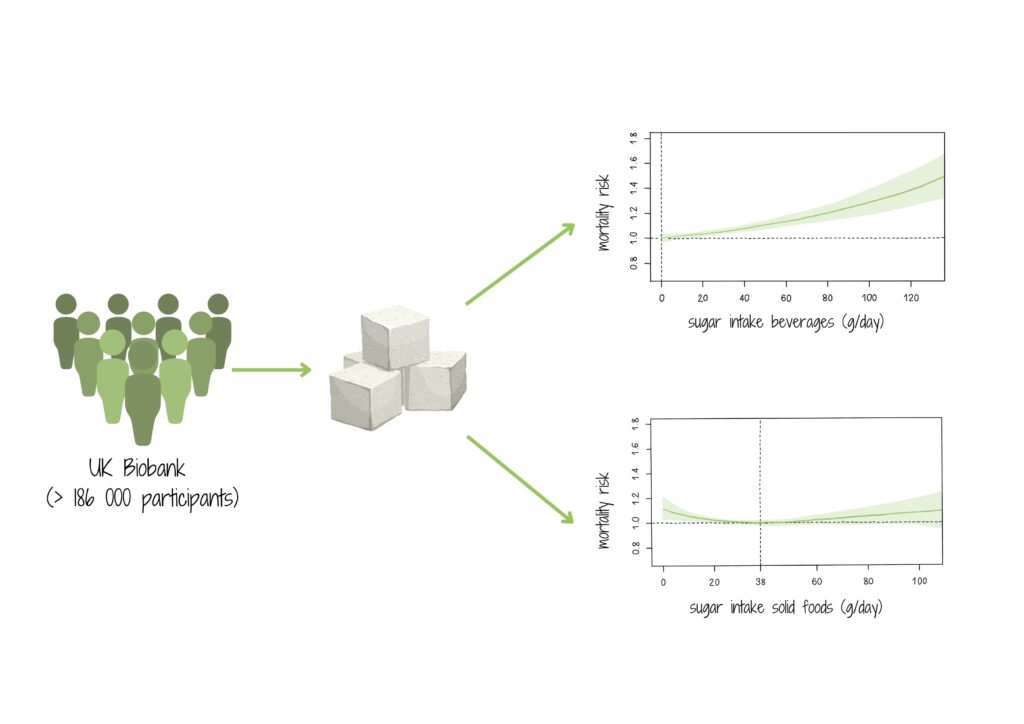
Major points:
- The scientific study by the Neatic team investigated over 186,000 individuals to determine if overall sugar consumption and sugar intake from specific foods are linked to mortality risk.
- Free sugars from beverages were associated with an increased mortality risk as consumption increased (upper figure), while no significant association was found for free sugars from solid foods (lower figure). Intrinsic sugars naturally present in fruits, vegetables, and dairy products were not associated with mortality risk.
- This study supports Neatic’s approach of exclusively limiting free sugars. Further research is needed to clarify the extent to which free sugars from beverages are particularly harmful.
What do we know about sugar?
The term “sugar” includes both free and intrinsic sugars.
Free sugars, as defined by the World Health Organization (WHO), include all sugars that manufacturers or consumers add to foods, as well as sugars naturally present in honey, syrups, fruit juices, and fruit juice concentrates.
Intrinsic sugars are those naturally found in whole fruits and vegetables, as well as lactose in milk and dairy products.
According to the WHO, negative health effects have been observed so far only for free sugars.
What does the study investigate?
Until now, it was not clearly established whether sugar consumption from specific foods influences mortality risk or if it is a general effect. The scientific study by the Neatic team therefore examined whether there is an association between overall sugar consumption as well as sugar intake from specific foods and mortality risk.
To answer this research question, data from the UK Biobank were used. The UK Biobank is a large study from the United Kingdom that recruited more than 500,000 participants between 2006 and 2010. For the Neatic team’s study, data from over 186,000 UK Biobank participants were analyzed. At the time of analysis, more than 8,500 participants had died. All participants included in the study had completed a 24-hour dietary recall in the form of an online questionnaire. This questionnaire included 206 foods and 32 beverages.
Based on the food information in the dietary recalls, the daily consumption of free and intrinsic sugars as well as the intake of free sugars from specific foods was calculated for each participant. Subsequently, statistical analyses were used to evaluate mortality risk in relation to daily sugar consumption.
What did the study find out?
The consumption of free sugars shows a clearly visible association with mortality risk.
Statistically, the risk of death was lowest with a consumption of 25 g of free sugars per day. From a daily intake of 50 g of free sugars, the mortality risk increased steadily. This corresponds to approximately 500 ml of soft drink. In contrast, no significant association between intrinsic sugars and mortality risk was found.
The examination of free sugars from beverages and from solid foods (e.g., cakes) showed that sweetened beverages also had a clearly visible association with mortality risk. Here, the risk of death was lowest at 0 g of free sugars and increased with higher consumption (upper figure). In contrast, there was no significant association between the intake of free sugars from solid foods and mortality risk (lower figure).
Furthermore, the Neatic team’s study analyzed four beverage categories: For sugar-sweetened beverages, the statistically lowest risk of death was at a daily intake of 0 g of free sugars, increasing with higher consumption. For milk-based drinks, a steady increase in mortality risk was observed from a consumption of 4 g of free sugars per day. For fruit juice as well as sweetened tea and coffee, no significant association between the intake of free sugars and mortality risk was found.
What is the conclusion of the study?
This study supports Neatic’s approach as well as the recommendations of the WHO and several professional societies (e.g., the German Nutrition Society) to reduce free sugars in the diet.
The study demonstrates an association between the consumption of free sugars in general and mortality risk. However, there is a difference between beverages and solid foods, as only free sugars in beverages are significantly associated with mortality risk.
To what extent free sugars from beverages – particularly in sugar-sweetened beverages and milk-based drinks – are particularly harmful needs to be clarified in further studies.
We have also investigated whether tea consumption is linked to mortality risk. If you would like to find out more, click here.
Bibliography
German Society for Nutrition (2018): Quantitative recommendation on sugar intake in Germany. Available online at https://www.dge.de/wissenschaft/stellungnahmen-und-fachinformationen/stellungnahmen/quantitative-empfehlung-zur-zuckerzufuhr-in-deutschland/, checked on 1/24/2024.
Kaiser, Anna; Schaefer, Sylva M.; Behrendt, Inken; Eichner, Gerrit; Fasshauer, Mathias (2022): Association of all-cause mortality with sugar intake from different sources in the prospective cohort of UK Biobank participants. Br J Nutr, pp. 1–25. DOI: 10.1017/S0007114522003233.
World Health Organization (2015): Guideline: sugars intake for adults and children. Available online at https://www.who.int/publications/i/item/9789241549028, checked on 3/30/2023.
